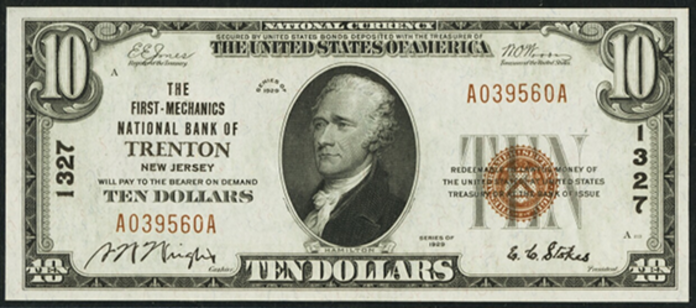Ten Dollar Notes › Nationals › 1929 Ten Dollar National Bank Notes › Washington Charters › 1929 $10 Lind Washington First National Bank
Get Value Now
| Item | Info |
|---|---|
| Series | 1929 |
| Charter | #9101 First National Bank of Lind, Washington |
| Year Chartered | 1908, 323 Banks Chartered |
| City Info | Lind is a town in Adams County, Washington, United States. The population was 564 at the 2010 census, a 3.1% decrease over the preceding census. Lind was first settled in 1888 on a relatively barren area along the Northern Pacific Railway's main line by the Neilson Brothers, James and Dugal. The site had previously been selected in 1881 for a station and section house and was named Lind by the railroad although the exact origin of that name has been lost. In the autumn of 1888 the Neilson Brothers built the first Lind residence and two years later they built and stocked a store and resumed postal service which until then had been processed in Ritzville and tossed off in town by passing trains. James Neilson became the first postmaster. The first school opened in 1889 with six students in attendance. The Neilson Brothers platted the town site on June 7, 1890 which consisted of only four square blocks. The Panic of 1893 would stave off any further development of the town site until the turn of the century. Source: Wikipedia |
| Similar Cities | 15 banks with similar city. First 12 below: 1. Lindsborg, Kansas - First National Bank 2. Lake Linden, Michigan - First National Bank 3. Lindsay, Oklahoma - First National Bank 4. Lindsay, Oklahoma - Lindsay National Bank 5. Linden, Alabama - First National Bank 6. Lindale, Texas - First National Bank 7. Lindsay, California - First National Bank 8. Lindenhurst, New York - First National Bank 9. Lindsay, California - Lindsay National Bank 10. Linden, Tennessee - First National Bank 11. Linden, Texas - First National Bank 12. Yorba Linda, California - First National Bank |
| Seal Varieties | Small Brown |
| See Also | If your note doesn't match try: 1. 1929 $10 Federal Reserve Bank Note 2. 1928 $10 Federal Reserve Note 3. 1928A $10 Federal Reserve Note 4. 1928B $10 Federal Reserve Note 5. 1928C $10 Federal Reserve Note 6. 1934 $10 Federal Reserve Note |
| Other Info | 1. Value depends on notes known for charter, condition and market demand. |
| Neat Fact | Notes from common charters are less valuable compared to rarer charters. Value also depends on type, denomination and total notes known for city, state and region. Ultimate determination of value is collector demand. |
No Obligations Offers and Appraisals
Please submit a good photo or scan. It will be identified and evaluated. Understand there may be subtle differences between the image you see above and your note. Signatures, design, markings and note condition will determine the offer price. Notes in Uncirculated or better condition receive the best offers.
Appraisals can be estimated for wholesale and retail prices. Wholesale is what dealers typically pay. Retail is what a collector might pay. Retail is slightly higher in most cases.
Please visit this page for USA Paper Money Reference. Do not treat this page as a reference guide, it is for appraisal and acquisition purposes only.
